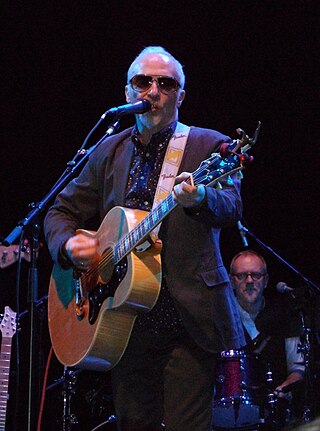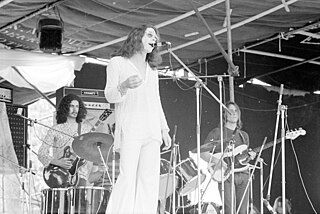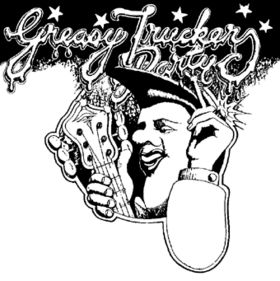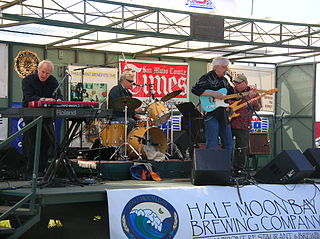Related Research Articles
Pub rock is a rock music genre that was developed in the early to mid-1970s in the United Kingdom. A back-to-basics movement which incorporated roots rock, pub rock was a reaction against the expensively-recorded and produced progressive rock and flashy glam rock scenes of the time. Although short-lived, pub rock was live rock played in small traditional venues like pubs and clubs. Since major labels showed no interest in pub rock groups, pub rockers sought out independent record labels such as Stiff Records. Indie labels used relatively inexpensive recording processes, so they had a much lower break-even point for a record than a major label.
Brinsley Schwarz were a 1970s English pub rock band, named after their guitarist Brinsley Schwarz. With Nick Lowe on bass and vocals, keyboardist Bob Andrews and drummer Billy Rankin, the band evolved from the 1960s pop band Kippington Lodge. They were later augmented by Ian Gomm on guitar and vocals.
Ducks Deluxe are an English pub rock band of the 1970s, who continue to tour and record new material. Usually called "The Ducks" by their fans, they were known for up-tempo, energetic performances, and the successful careers of their members, after they disbanded.

Nicholas Drain Lowe is an English singer-songwriter, musician and producer. A noted figure in power pop and new wave, Lowe has recorded a string of well-reviewed solo albums. Along with vocals, Lowe plays guitar, bass guitar, piano and harmonica.
Popular music of the United Kingdom in the 1970s built upon the new forms of music developed from blues rock towards the end of the 1960s, including folk rock and psychedelic rock. Several important and influential subgenres were created in Britain in this period, by pursuing the limitations of rock music, including British folk rock and glam rock, a process that reached its apogee in the development of progressive rock and one of the most enduring subgenres in heavy metal music. Britain also began to be increasingly influenced by third world music, including Jamaican and Indian music, resulting in new music scenes and subgenres. In the middle years of the decade the influence of the pub rock and American punk rock movements led to the British intensification of punk, which swept away much of the existing landscape of popular music, replacing it with much more diverse new wave and post punk bands who mixed different forms of music and influences to dominate rock and pop music into the 1980s.

Graham Thomas Parker is an English singer-songwriter, who is best known as the lead singer of the British band Graham Parker & the Rumour.

Quintessence was a rock band formed in April 1969 in Notting Hill, London, England. Their style was a mixture of jazz, psychedelic rock and progressive rock with an influence of music from India.
Nucleus were a British jazz-fusion band, which continued in different forms from 1969 to 1989. In 1970, the band won first prize at the Montreux Jazz Festival, released the album Elastic Rock, and performed both at the Newport Jazz Festival and the Village Gate jazz club.
Ian Robert Gomm is a British singer-songwriter, who was the rhythm guitarist for Brinsley Schwarz from 1970 to 1974. He was named "Best Rhythm Guitarist" by NME in 1971.

Greasy Truckers Party is a 1972 live album by various artists recorded at a February 1972 Greasy Truckers concert at the Roundhouse in London. The concert featured three bands, Man, Brinsley Schwarz, and Hawkwind, and musician Magic Michael. Originally a double vinyl album, in a limited edition of 20,000 and sold at just £1.50, it rapidly sold out, and became a collector's item.
In the world of British underground rock, the Greasy Truckers Party ... ... looms about as large as the Monterey International Pop Festival does in American rock lore; it wasn't the biggest gig ever played by the bands involved, but for reasons of exposure, and resulting word-of-mouth, and the excerpted live album that followed, it came to define what they were capable of.
Bees Make Honey were an influential band in the early pub rock movement in the UK.
Hux Records is a British record label based in England, which was launched in 1998. They specialise in releasing old material, especially in unreleased BBC recordings such as John Peel Sessions and BBC Radio 1 concerts. Hux has gained a reputation as an excellent independent record label, offering an eclectic selection of classic archive recordings. Hux has also re-released recordings by such artists as Malcolm Morley's Sam Apple Pie and Help Yourself; and Man's debut album, which was recorded in 1976 but not released latterly.
Help Yourself, known to their fans as "The Helps", were an English rock band of the early 1970s whose style developed from "American-flavoured country-rock ... to acid-drenched psych."
Dave Charles, also known as David Charles is a British drummer, recording engineer & record producer. He often appears under both names on the same album, e.g. Help Yourself's The Return of Ken Whaley, where Dave Charles is credited with drums and vocals and David Charles as producer.
William Hector Rankin III is an English rock drummer, active in the 1960s and 1970s.
Ernie Graham was a Northern Irish singer, guitarist and songwriter, active from the mid-1960s to the early 1980s.
Micky Groome is an English bassist, guitarist, vocalist, songwriter, and producer.
Malcolm Morley is an English rock singer, guitarist and keyboard player who came to fame in the 1970s. Best known as a founder of Help Yourself and as a member of Man, he continues to perform to this day.
Ken Whaley was a rock music bass guitar player, best known as a founding member of Help Yourself and Ducks Deluxe, and as a member of Deke Leonard's Iceberg, Man and The Tyla Gang. He also played with The Archers and The Green Ray.

Austin de Lone is an American keyboardist who records and tours with his own bands as well as with other artists, such as Bill Kirchen, Elvis Costello, Bonnie Raitt, Boz Scaggs, Nick Lowe, Commander Cody, and Loudon Wainwright.
References
- 1 2 3 "Eggs Over Easy - Biography & History". AllMusic . Retrieved 30 December 2018.
- 1 2 3 4 5 6 7 8 Birch, Will (2003). No Sleep Till Canvey Island – The Great Pub Rock Revolution (1st ed.). London: Virgin Books Ltd. pp. 120–129. ISBN 0-7535-0740-4.
- 1 2 3 Joynson, Vernon (2006). The Tapestry of Delights Revisited (1st ed.). Telford: Borderline productions. p. 246. ISBN 1-899855-15-7.
- ↑ "- news, reviews, biography, video, youtube videos, discography, books, DVDS, concerts, gossip, pictures and tour dates". NME . Archived from the original on 2009-05-31. Retrieved 2019-01-01.
- 1 2 3 4 "Pub Rock- Pre Punk music". Punk77.co.uk. Retrieved 30 December 2018.
- 1 2 "Nick Lowe: the true blue Basher shows up for a friend". The Fortnightly Review. December 18, 2010. Retrieved 2010-12-18.
- 1 2 3 4 5 6 Sleevenotes by Nigel Cross to the 2006 Hux Records Re-release
- ↑ [ permanent dead link ]
- ↑ "Bees Make Honey - Biography & History". AllMusic . Retrieved 30 December 2018.
- ↑ "Eggs On". Sounds . Spotlight Publications. 28 August 1971. p. 2.
- ↑ "Good 'n' Cheap - Eggs Over Easy - Songs, Reviews, Credits". AllMusic . Retrieved 30 December 2018.
- 1 2 "Hux Records - Biography - Barefoot Jerry - Clint Black - Eggs Over Easy - Bridget St.John". Huxrecords.com. Retrieved 30 December 2018.
- ↑ "Archived copy". Archived from the original on 2018-10-09. Retrieved 2019-01-01.
{{cite web}}: CS1 maint: archived copy as title (link)